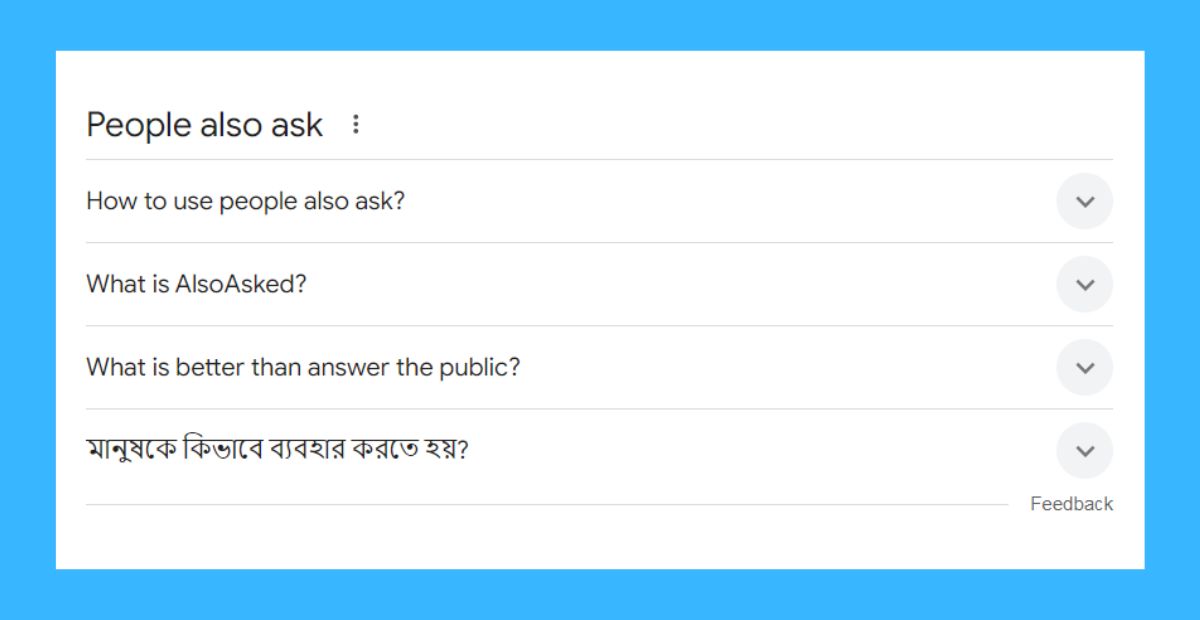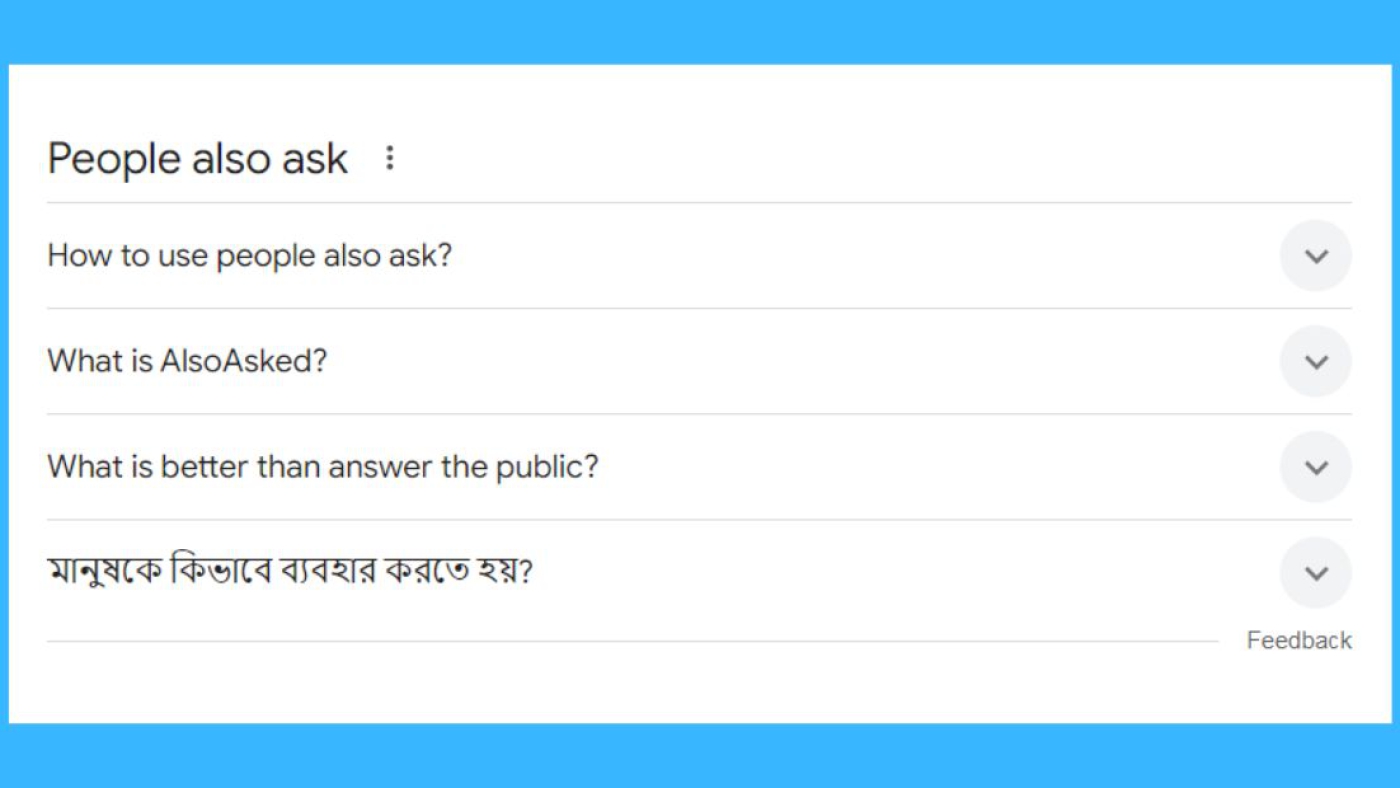As the world of SEO continues to evolve, Google’s “People Also Asked Alternatives” (PAA) section has become an essential tool for boosting search engine visibility. PAA boxes provide users with additional, related questions that are relevant to their queries. By answering these questions, websites can improve their ranking and offer immediate value to users.
However, focusing solely on PAA boxes isn’t enough. There are numerous alternative platforms and strategies beyond PAA that businesses and content creators can use to optimize their content, answer frequently asked questions, and capture a larger audience. These alternatives go beyond traditional search engine tactics, helping brands diversify their content strategy and extend their reach.
In this comprehensive guide, we’ll dive into how you can optimize your content for the “People Also Asked” feature and its alternatives—helping you get more organic traffic from various channels, such as social media, question-answer forums, video platforms, and even voice search.
Table of Contents:
- What is “People Also Asked” (PAA)?
- Why Focus on Alternatives to PAA?
- Diversifying Your Content Strategy for PAA Alternatives
- The Power of Long-Tail Keywords in Optimizing for PAA Alternatives
- Utilizing Quora, Reddit, and Niche Forums
- Video Platforms: YouTube and Beyond
- Voice Search Optimization for “People Also Asked” Queries
- Rich Snippets: Capturing Attention Beyond PAA
- Repurposing Content for Maximum Reach Across Platforms
- How to Use Social Media to Engage with PAA-Style Queries
- Using Tools to Find Related Questions and PAA Alternatives
- Local SEO and the PAA Effect in Voice Search
- Tracking, Measuring, and Optimizing Performance
- Conclusion
1. What is “People Also Asked” (PAA)?

Before diving into alternatives, it’s essential to understand what PAA is and why it’s a key part of search results today. The PAA feature was introduced by Google as an interactive question-and-answer box that typically appears at the top or in the middle of search engine result pages (SERPs). When users type in a query, the PAA section shows them related questions that people have also searched for, along with short answers.
For example, if someone searches for “best ways to improve SEO,” the PAA box may show additional questions like:
- How can I improve my on-page SEO?
- What are the best tools for SEO in 2024?
- How does off-page SEO impact rankings?
The importance of PAA boxes lies in their ability to provide direct, concise answers that increase user engagement and satisfaction. Optimizing content to appear in these PAA sections can dramatically boost traffic.
However, searchers don’t always use Google or other search engines to find answers. Platforms like Quora, YouTube, Reddit, and even voice assistants like Google Home or Amazon Alexa are becoming popular destinations for answering questions. These alternatives can provide an untapped market to draw traffic to your website.
2. Why Focus on Alternatives to People Also Asked?
While the PAA feature on Google is a valuable tool for SEO, relying solely on it can limit your growth potential. The key is to diversify your strategy by targeting PAA-like features on other platforms and mediums. The main reasons to focus on alternatives are:
- More Traffic Channels: Optimizing for PAA alternatives opens up more pathways for organic traffic. You can attract visitors from various platforms, question forums, social media sites, and voice searches.
- Diverse Audience Engagement: Different platforms attract different types of users. For instance, YouTube caters to those who prefer video content, while Quora and Reddit draw users who engage in text-based question-and-answer discussions.
- Multi-Platform Authority: By optimizing for PAA alternatives, you increase your authority across different channels. When you provide consistent answers across platforms, search engines and users perceive you as an expert in your industry.
- Voice Search: The rise of voice search (driven by smart assistants) is shaping how people ask questions online. Voice queries are typically longer and conversational, and many PAA alternatives cater to this shift in search behavior.
3. Diversifying Your Content Strategy for People Also Asked Alternatives
When optimizing for PAA alternatives, you’ll need to adapt your content to fit the specific requirements of various platforms. Here are strategies for diversifying your content to meet the needs of multiple platforms:
Quora and Reddit: Community-Driven Content
Both Quora and Reddit are driven by user-generated content, where users ask questions, seek advice, and share opinions. These platforms offer a treasure trove of potential for brands that are willing to participate in discussions and provide genuine value.
- Quora: Find relevant questions within your niche by searching with targeted keywords. Once you’ve identified popular questions, answer them in a detailed, thoughtful, and helpful manner. Be sure to include a link back to your website or blog, but avoid being overly promotional.
- Reddit: Reddit is similar to Quora in that users post questions and seek advice. However, it is more community-driven, and users tend to be more skeptical of overt promotions. Engage with communities (subreddits) relevant to your industry, contribute meaningfully to discussions, and subtly link to your content where it’s appropriate.
YouTube Videos: Optimizing for Video-Based Queries
YouTube is the world’s second-largest search engine, making it an essential platform for content creators and businesses alike. Many users turn to YouTube to answer questions visually, rather than reading text-based articles.
- Create Concise, Informative Videos: Address popular questions directly in your video content. The shorter and clearer your answers, the better your chances of ranking well in YouTube’s search results.
- Optimize Your Titles, Tags, and Descriptions: Just as with traditional SEO, it’s vital to optimize the video title, description, and tags with targeted keywords. Ensure that these elements reflect the specific questions your video answers.
- Leverage YouTube’s Search Autocomplete Feature: Type relevant keywords into the YouTube search bar, and note the suggestions that appear. These suggestions are typically the most common queries users search for, giving you valuable insight into the topics you should cover.
4. The Power of Long-Tail Keywords in Optimizing for People Also Asked Alternatives
Long-tail keywords are critical for optimizing content not just for Google’s PAA but also for alternatives like YouTube, Quora, and voice search. These keywords are more specific, longer, and typically lower in search volume but are incredibly valuable for targeting niche audiences and answering specific user queries.
Why Long-Tail Keywords Matter:
- Better Conversion Rates: Long-tail keywords tend to bring in more qualified traffic since the users searching for them are often closer to making a decision.
- Lower Competition: Targeting long-tail keywords means competing with fewer websites, giving you a higher chance of ranking well in search results.
How to Use Long-Tail Keywords in People Also Asked Alternative Strategies:
- Keyword Research Tools: Use tools like SEMrush, Ahrefs, and Google Keyword Planner to find relevant long-tail keywords within your niche.
- Natural Language Queries: Long-tail keywords often resemble how people naturally speak or type. These natural language phrases are particularly important for voice search optimization.
- Incorporate Keywords Across Platforms: Whether you’re creating a blog post, answering a question on Quora, or creating a YouTube video, make sure you’re weaving long-tail keywords into the content naturally.
5. Utilizing Quora, Reddit, and Niche Forums
Question-and-answer sites like Quora and Reddit have become valuable resources for SEO specialists. These platforms allow you to answer direct questions from users, build authority, and create backlinks to your content.
Quora:
- Find and Answer Questions: Begin by searching for topics related to your industry or niche. Pay attention to the questions that have a high number of followers or upvotes, as these are the ones with the most visibility.
- Provide In-Depth Answers: When answering questions on Quora, aim to be as helpful and comprehensive as possible. Short, vague answers won’t provide much value, and they may not inspire users to click through to your website.
- Add Links When Appropriate: Once you’ve answered a question, add a relevant link back to your blog post or website. However, avoid spamming or adding too many links, as Quora moderators may flag your answer.
Reddit:
- Participate in Subreddits: Find niche subreddits related to your industry. For example, if you’re in the SEO field, you can join subreddits like r/SEO, r/Marketing, or r/DigitalMarketing. Participate in discussions, share your insights, and provide value without being too promotional.
- Build Credibility: Reddit users are often wary of self-promotion. Focus on genuinely engaging with the community, answering questions, and providing resources without pushing your services. Once you’ve built credibility, you’ll have more freedom to share links to your content.
6. Video Platforms: YouTube and Beyond
Video content is becoming a dominant form of communication, especially for answering questions and delivering information. Optimizing your video content for question-based queries is crucial for capitalizing on alternatives to the PAA box.
Optimizing Videos for Queries:
- Targeted Video Content: Create short, focused videos that directly address common questions. For example, if you’re in the digital marketing space, you might create videos on “How to optimize for local SEO” or “What is the best SEO strategy for small businesses?”
- Optimize Video Descriptions and Titles: The title and description of your video play a significant role in whether it ranks for question-based queries. Include long-tail keywords that reflect the types of questions people are asking.
- Closed Captions and Transcripts: Adding captions and transcripts to your videos can improve accessibility and also boost your SEO. These features allow search engines to “read” your video content, which improves its chances of ranking for relevant queries.
Beyond YouTube:
- Vimeo, Instagram, and TikTok: While YouTube is the largest video platform, don’t ignore alternatives like Vimeo, Instagram, and TikTok. Instagram’s IGTV and TikTok’s short-form video format are particularly popular with younger audiences.
- Optimizing for TikTok: TikTok is becoming a powerful search engine for Gen Z users. Create informative, short videos that answer popular questions. Use hashtags and trending challenges to increase visibility.
7. Voice Search Optimization for “People Also Asked” Queries
The rise of voice search is transforming how users interact with search engines. Devices like Google Home, Amazon Alexa, and Apple’s Siri are increasingly used to answer user questions, often in a conversational manner.
Voice Search Optimization Strategies:
- Natural Language Queries: Voice searches are often longer and more conversational. For example, instead of typing “best restaurants in Chicago,” a voice search user might ask, “What are the best restaurants near me in Chicago?”
- Featured Snippets and Voice Search: Many voice search results are pulled from featured snippets. By optimizing your content to appear in featured snippets, you increase your chances of being chosen as the voice search result.
- Focus on Local SEO: Many voice search queries are local in nature. Make sure your website is optimized for local SEO by including your location and business information. For instance, a voice search might ask, “Where can I find a plumber near me?”
8. Rich Snippets: Capturing Attention Beyond PAA
Rich snippets are a form of structured data markup that provides extra information to search engines, making your content more appealing in search results. These snippets can answer questions directly, often before the user clicks through to a website.
How to Optimize for Rich Snippets:
- Use Schema Markup: Schema markup helps search engines understand the content of your website. There are various types of schema markup, including FAQPage, HowTo, and Q&A, which can help you rank for question-based queries.
- Create Clear, Concise Answers: Structure your content in a way that provides clear, concise answers to questions. Use headings, bullet points, and numbered lists to make your content more likely to be chosen for rich snippets.
- Monitor and Optimize: Use tools like Google Search Console to track whether your content is being featured in rich snippets. If your content isn’t appearing, revisit the structure of your content and adjust it accordingly.
9. Repurposing Content for Maximum Reach Across Platforms
Repurposing content is a powerful strategy for maximizing your content’s reach across various platforms. For example, a blog post that answers a question can be repurposed into a video, infographic, podcast, or social media post.
Ways to Repurpose Content:
- Turn Blog Posts into Videos: If you’ve written a blog post answering a common question, repurpose that content into a video for YouTube. This allows you to reach an audience that prefers video content.
- Create Infographics: Visual content like infographics can be shared on social media platforms like Pinterest, Instagram, and LinkedIn. They’re particularly effective at condensing complex information into easy-to-digest visuals.
- Podcast Episodes: Turn your blog posts or videos into podcast episodes that answer common questions. Podcasts are an excellent way to reach audiences who prefer audio content.
- Social Media Posts: Break down your blog posts into bite-sized snippets for social media. Share tips, statistics, or summaries that encourage users to engage with your content and visit your website.
10. How to Use Social Media to Engage with PAA-Style Queries
Social media platforms like Facebook, Twitter, Instagram, and LinkedIn offer opportunities to engage with users who are asking questions similar to those in Google’s PAA box.
Engaging with PAA-Style Queries on Social Media:
- Twitter: Use Twitter’s search function to find users asking questions relevant to your niche. Respond with helpful answers and links to your content where appropriate. Twitter threads are also an excellent way to engage with a larger audience.
- Instagram Q&A Sessions: Instagram’s Stories feature allows you to host Q&A sessions, where followers can ask questions, and you can respond in real-time. These sessions help build relationships with your audience and address frequently asked questions.
- LinkedIn Articles and Discussions: LinkedIn is an excellent platform for B2B engagement. Write articles or start discussions around common questions in your industry. Engaging with professionals through LinkedIn increases your authority and visibility.
11. Using Tools to Find Related Questions and PAA Alternatives
To optimize for PAA alternatives, it’s essential to understand what questions users are asking. Fortunately, there are several tools available that can help you find related questions and topics for which to create content.
Top Tools for Finding PAA Alternatives:
- AnswerThePublic: This tool allows you to enter a keyword and see a visual representation of related questions people are asking. It’s ideal for finding new content ideas and identifying questions you should target.
- BuzzSumo: BuzzSumo shows you the most popular content for specific topics, helping you identify the questions that users are most interested in. Use this tool to create content that answers these popular questions.
- Quora: Quora itself can be a valuable resource for finding popular questions related to your niche. Use its search function to discover top-rated questions that are receiving high engagement.
- SEMrush and Ahrefs: These tools provide comprehensive keyword research and can help you identify long-tail keywords and common questions that users are searching for across platforms.
12. Local SEO and the PAA Effect in Voice Search
Local SEO is crucial when optimizing for PAA alternatives, especially voice search. Many voice search queries are location-based, with users asking for recommendations, directions, or services in their local area.
Optimizing for Local SEO and Voice Search:
- Google My Business: Ensure your business is listed on Google My Business and that all your details are accurate. This will increase your chances of showing up in local search results and voice search queries.
- Location-Based Keywords: Include location-based keywords in your content to optimize for local search queries. For instance, instead of targeting “SEO services,” target “SEO services in New York.”
- Local FAQ Pages: Create FAQ pages that address common questions specific to your location. This not only helps with voice search optimization but also provides valuable content for users searching locally.
13. Tracking, Measuring, and Optimizing Performance
Optimizing for PAA alternatives requires regular monitoring and adjustments. Use analytics tools to measure the performance of your content across various platforms and track which strategies are driving the most traffic.
Tools for Measuring Performance:
- Google Analytics: Use Google Analytics to track how much traffic is coming from alternative platforms like Quora, Reddit, and YouTube. Analyze which pages or videos are performing best and adjust your strategy accordingly.
- YouTube Analytics: For video content, use YouTube Analytics to track viewer engagement, watch time, and the keywords your videos are ranking for.
- Social Media Analytics: Each social media platform has its own analytics tool that allows you to track engagement, click-through rates, and follower growth.
Refining Your Strategy:
Once you’ve gathered data, refine your content strategy based on performance. Focus more on platforms that are generating the most traffic and engagement, and adjust your approach on underperforming channels.
14. Conclusion
While optimizing for Google’s “People Also Asked” feature is an essential part of SEO, there are many alternative platforms and strategies that can help you reach a broader audience. From question-answer sites like Quora and Reddit to video platforms like YouTube, optimizing your content for multiple channels will boost your visibility, build authority, and generate more traffic.
Remember to diversify your content, target long-tail keywords, repurpose content across various formats, and engage with users on their preferred platforms. By focusing on these PAA alternatives and consistently refining your strategy, you’ll be well on your way to dominating search results beyond traditional Google queries.


Add a Comment